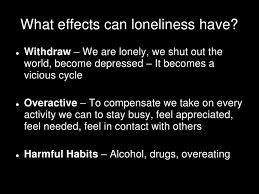Loneliness- Fear Of Being Alone
Apr 03, 2019 • 24 views
Loneliness should not be equated with a fear of being alone. Everyone has times when they are alone for situational reasons, or because they have chosen to be alone. Being alone can be experienced as positive, pleasurable, and emotionally refreshing if it is under the individual's control. Solitude is the state of being alone and secluded from other people, and often implies having made a conscious choice to be alone. Loneliness is therefore unwilling solitude.
Understanding Loneliness

Loneliness is an emotional state in which a person experiences a powerful feeling of emptiness and isolation. Loneliness is more than just the feeling of wanting company or wanting to do something with another person. Loneliness is a feeling of being cut off, disconnected, and/or alienated from other people, so that it feels difficult or even impossible to have any form of meaningful human contact. Lonely people often feel empty or hollow inside.
Being alone and lonely, and even just the fear of being alone, make many people insecure,anxiousanddepressed.If you fear being alone you may become over needy of other people and feel as if you must be around people at all times.While we all, to varying degrees, need people in our life, if you feel you must have people around all the time then this need is controlling you.
What is meant by "being alone" means different things to different people.It is critical to evaluate what makes up your fear and to what degree this fear controls you and your behavior. For example, it is important to note if there are any social elements to the fear, is the fear related to personal violence concerns, and is the focus on one particular person or type of person rather than on the need to have another human being in close proximity.

Clinical and research evidence supports the fact that all too often one of the main reasons that both men and women get into a relationship, and then often stay in a relationship, is related to a fear of being alone.And as any good counselor knows, a relationship that is based on fear is destined to be a very unhappy and unfulfilling relationship. Until a person can learn to enjoy their own company, they may constantly find themselves lonely or getting into relationships that are, or end up, based on fear.All too often, people who are not comfortable with themselves unknowingly stop themselves from not only being the best person they can be but from experiencing deep levels of intimacy with others as well.
At the extreme, the fear of being alone is known by a number of names - Autophobia, Isolaphobia, andMonophobia. This fear of being alone often significantly impacts on a person's quality of life. It can causepanic attacks, keep people apart from loved ones and business associates, and play total havoc with a person's life.Symptoms typically include shortness of breath, rapid breathing, irregular heartbeat, sweating, nausea, and overall feelings of dread, although everyone experiences being alone fear in their own way and may have different symptoms.
Effects of Loneliness

The effects of loneliness and the fear of being alone can lead to panic attacks,phobias,depression, suicide,drug addiction,alcohol addiction, and acute and chronic illness.Chronic loneliness (as opposed to the normal loneliness everyone feels from time to time) can be a serious condition and has been associated with an increased risk of death from cancer as well as stroke and cardiovascular disease. People who are socially isolated also report poor sleep quality and thus have diminished restorative processes.
What causes of loneliness and a fear of being alone?
People can experience loneliness for many reasons, and many life events are related to loneliness. Loneliness is a very common response todivorceor the breakup/loss of any important long-term relationship. In these cases it may stem both from the loss of a specific person, as well as from the withdrawal from social circles caused by the event or the associated sadness.
Loneliness can be a response to a specific situation or event, such as the death or extended absence of a loved one. Loneliness may also occur after the birth of a child, after marriage or after any minor or major life event. Loneliness can occur in marriages or similar close relationships where there is anger/resentment or a lack of "loving" communication.
